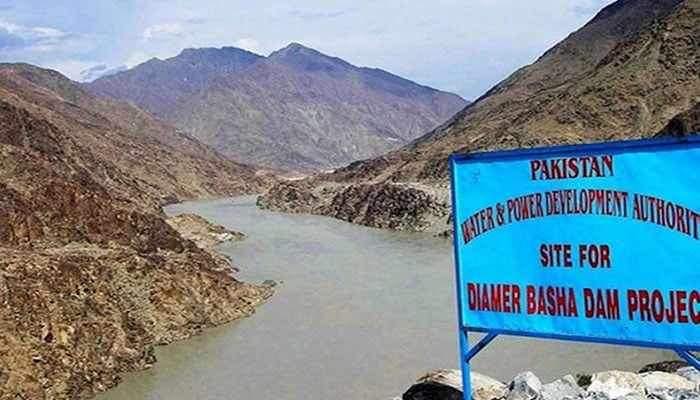Pakistan seeks $3.5bn financing from KSA for Diamer-Bhasha dam
Wapda has asked Saudi Arabia to provide concessional loan of $2.3 billion at 2.25pc interest rate for 25 years with grace period of six years
ISLAMABAD: Pakistan has sought $3.5 billion financing from the Kingdom of Saudi Arabia (KSA) for Diamer-Bhasha Dam during the visit of a high-powered delegation from KSA on April 15-16.
“The authorities in KSA would respond to Pakistan after the input of the financial adviser on Diamer-Bhasha Dam. The financial adviser to be appointed by KSA would carry out due diligence of the project and business model which Pakistan authorities pitched before the Saudi delegation,” a senior government official told The News.
“Wapda would also appoint a financial adviser (FA), which will deal with the FA on the project appointed by KSA.” The formal request is likely to come from KSA in 1.5-2 months.
The cost of Diamer-Bhasha Dam stands at $8 billion out of which foreign component stands at $4 billion. Wapda has arranged $500 million through its Euro Bond.
Out of $3.5 billion, Wapda asked the KSA authorities to provide concessional loan of $2.3 billion at 2.25pc interest rate for 25 years with grace period of six years. It sought $1.2 billion as its equity in the project at 4.45pc at par with the interest cost of US 10-year Treasury Bond.
The Saudi Fund has already provided $240 million as concessional loan at 2.25pc for 25 years. The Diamer-Basha Dam project is being constructed on a 30pc equity and 70pc debt ratio. This is the biggest dam in Pakistan and tallest RCC (Roller Compacted Concrete) in the world.
Work has already begun on the dam part of the project. The dam will have capacity to generate around 18 billion GWh annually. 4,500 megawatts of electricity will be generated with gross storage capacity of 8.10 MAF (million acres feet) of water, while live storage capacity will be 6.4 million MAF.
-
 Eric Dane Says Touching Goodbye To Daughters Billie And Georgia In New Netflix Documentary
Eric Dane Says Touching Goodbye To Daughters Billie And Georgia In New Netflix Documentary -
 Channing Tatum Reveals What He Told Daughter After Violent Incident At School
Channing Tatum Reveals What He Told Daughter After Violent Incident At School -
 King Charles Lands In The Line Of Fire Because Of Andrew Mountbatten-Windsor
King Charles Lands In The Line Of Fire Because Of Andrew Mountbatten-Windsor -
 Denise Richards Doubles Down On Abuse Claims Against Ex Husband Aaron Phypers Amid Show Return
Denise Richards Doubles Down On Abuse Claims Against Ex Husband Aaron Phypers Amid Show Return -
 Russia Set To Block Overseas Crypto Exchanges In Sweeping Crackdown
Russia Set To Block Overseas Crypto Exchanges In Sweeping Crackdown -
 Gwyneth Paltrow Reveals Deep Personal Connection With Kate Hudson
Gwyneth Paltrow Reveals Deep Personal Connection With Kate Hudson -
 Prince Harry, Meghan Markle’s Game Plan For Beatrice, Eugenie: ‘Extra Popcorn For This Disaster’
Prince Harry, Meghan Markle’s Game Plan For Beatrice, Eugenie: ‘Extra Popcorn For This Disaster’ -
 OpenAI To Rollout AI Powered Smart Speakers By 2027
OpenAI To Rollout AI Powered Smart Speakers By 2027 -
 Is Dakota Johnsons Dating Younger Pop Star After Breakup With Coldplay Frontman Chris Martin?
Is Dakota Johnsons Dating Younger Pop Star After Breakup With Coldplay Frontman Chris Martin? -
 Hilary Duff Tears Up Talking About Estranged Sister Haylie Duff
Hilary Duff Tears Up Talking About Estranged Sister Haylie Duff -
 US Supreme Court Strikes Down Trump’s Global Tariffs As 'unlawful'
US Supreme Court Strikes Down Trump’s Global Tariffs As 'unlawful' -
 Kelly Clarkson Explains Decision To Quit 'The Kelly Clarkson Show'
Kelly Clarkson Explains Decision To Quit 'The Kelly Clarkson Show' -
 Inside Hilary Duff's Supportive Marriage With Husband Matthew Koma Amid New Album Release
Inside Hilary Duff's Supportive Marriage With Husband Matthew Koma Amid New Album Release -
 Daniel Radcliffe Admits To Being Self Conscious While Filming 'Harry Potter' In Late Teens
Daniel Radcliffe Admits To Being Self Conscious While Filming 'Harry Potter' In Late Teens -
 Director Beth De Araujo Alludes To Andrew's Arrest During Child Trauma Talk
Director Beth De Araujo Alludes To Andrew's Arrest During Child Trauma Talk -
 Video Of Andrew 'consoling' Eugenie Resurfaces After Release From Police Custody
Video Of Andrew 'consoling' Eugenie Resurfaces After Release From Police Custody




